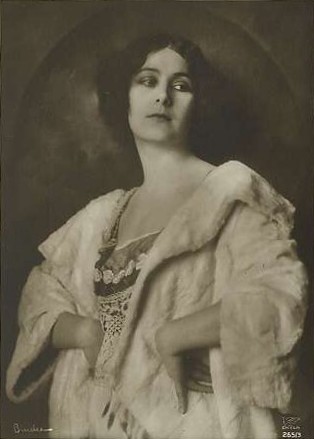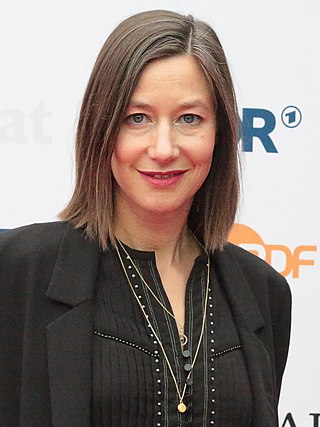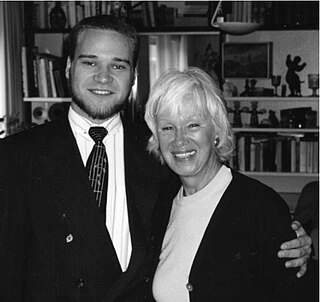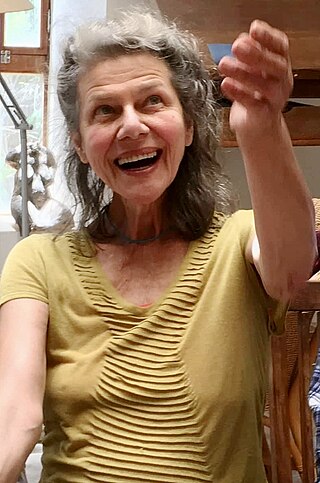

Marie Burchard (born 1982), is a German stage and screen actress.


Marie Burchard (born 1982), is a German stage and screen actress.
Marie Caroline Burchard was born in Bonn, Germany and grew up in France. She was educated at the German School in Paris and studied drama at the Hochschule für Schauspielkunst Ernst Busch in Berlin, [1] where she met her husband, actor Sebastian Schwarz.
She rose to fame for her role as Dunja in Andrea Breth’s rendition of Dostoyevsky’s Crime and Punishment at the 2008 Salzburg Festival. In 2009, Breth cast Burchard in the role of Eve, the female lead in Kleist’s The Broken Jug. At the Schaubühne, Berlin, Marie Burchard took on numerous lead roles, including in Marius von Mayenburg’s comedy Stück Plastik (2015), Stefan Zweig’s Beware of Pity (adapted and directed by Simon McBurney for the Barbican, London 2017) and Ödön von Horvath’s Italian Night, directed by Thomas Ostermeier, 2018).
In 2022, Marie Burchard appeared alongside Florian David Fitz and Senta Berger in the highly acclaimed comedy drama Oskars Kleid, where she played the mother of a nine-year old boy, who decides to be a girl. Oskars Kleid received the Bambi Award 2023 for best film. Her next film was Michael Bully Herbig’s A Thousand Lines, where Burchard starred alongside Elyas M'Barek. The film centers on the case of former Der Spiegel journalist Claas Relotius. From 2018 to 2021, Marie Burchard played alongside her sister, the actress Bettina Burchard, in the RTL comedy Sankt Maik. [2]
Marie Burchard is married to the German actor Sebastian Schwarz. They live in Berlin and have two children. Burchard is also the great-niece of modernist architect [2] and Bauhaus-founder Walter Gropius and the sister of actress Bettina Burchard [3] and art historian and curator Wolf Burchard.

Margarete Emma Dorothea "Grete" Mosheim was a German film, theatre, and television actress.
Andrea Clausen is a German stage actress and a member of the Burgtheater ensemble.

Karl Hartl was an Austrian film director.
Bayerischer Fernsehpreis is an award presented by the government of Bavaria, Germany since 1989. The prize symbol is the "Blue Panther", a figure from the Nymphenburg Porcelain Manufactory. The prize money is €10,000.

Lil Dagover was a German actress whose film career spanned between 1913 and 1979. She was one of the most popular and recognized film actresses in the Weimar Republic.

Johanna Wokalek is a German stage and film actress. A student of Klaus Maria Brandauer, she received critical recognition and three newcomer awards for her performance in the play Rose Bernd. Wokalek is best known for her award-winning appearances in the German films Hierankl, Barfuss, and The Baader Meinhof Complex. She received the Bambi award for her portrayal of the Red Army Faction member Gudrun Ensslin in 2008. She played the lead role in the film Pope Joan in 2009.

Johanna von Koczian was a German actress. She grew up in Salzburg where Gustaf Gründgens offered her a role at the 1951 Salzburg Festival, and she played at several German theatres. She had her first film role in the 1957 film Victor and Victoria, and her breakthrough a year later in Wir Wunderkinder which earned her a German Film Award. She was named "the German Audrey Hepburn" then. She appeared in many films, also on television, became popular again as a singer with the 1977 hit "Das bißchen Haushalt", presented television series and authored books for children and youths. She returned to the stage for comedies such as Glorious!, performed with great success in Berlin in 2010.

Inka Friedrich is a German actress.

Maria Katharina Helene Sebaldt was a German actress.

Lien Deyers was a Dutch actress based in Germany.
Angelika Hauff (1922–1983) was an Austrian stage and film actress. She worked prolifically as a film actress in the immediate aftermath of the Second World War appearing in the lead roles in several successful films that included The Marriage of Figaro and Dark Eyes (1951). A versatile actor, she appeared in a variety of cinematic genres in Germany and Austria and attained international recognition in French, English and Italian films. She was a preeminent stage actress with the prestigious Vienna Burgtheatre portraying classic German language roles and being awarded the highest acting honours.

Jannik Schümann is a German actor. He received three Jupiter Awards for Best Actor, for his role of Danny in Close to the Horizon (2020), 9 Days Awake (2021), and the role of Franz Joseph I in Sisi (2022). He is also known for his role in The Aftermath (2019), Center of My World (2016), Die Diplomatin (2016–2023), Monster Hunter (2020), Tribes of Europa (2021), or Charité at War (2019).

Franz Rogowski is a German actor. He has appeared in films directed by Michael Haneke, Christian Petzold, Andrea Arnold, and Terrence Malick.
Thelma Buabeng is a German actress.

Bettina Kupfer is a German actress and author who has been active since the 1980s. She and her husband, Arend Agthe, write screenplays and children's literature.
Folker Bohnet was a German actor, theatre director and playwright. He played in the 1959 film Die Brücke directed by Bernhard Wicki while still a student in Berlin. Later, he focused on comedy for the stage, as actor, director and author of plays, touring internationally. He was a regular director and actor at the Ohnsorg-Theater in Hamburg.

Christel Magdalena Huber, known as Grischa Huber was a German theatre and film actress. She is known for the lead role in the film Under the Pavement Lies the Strand, a "cult film of the German feminist movement", which earned her the Filmband in Gold in 1975.
Elisa Johanna Lucie Schlott is a German actress. Her younger half-sisters are the actresses Emilia Pieske and Helena Pieske.
Bettina Böhler is a German film editor.

Wilhelmine Sandrock was a German actress, active in theatre, silent and early sound films.